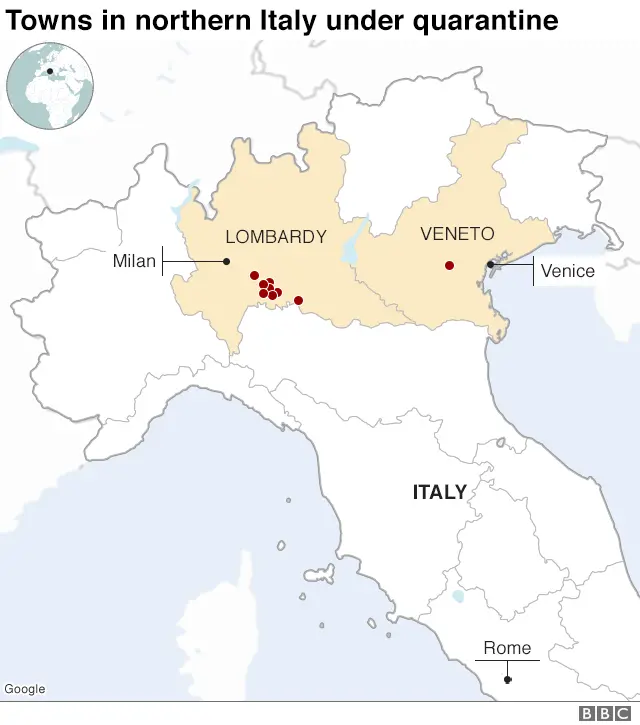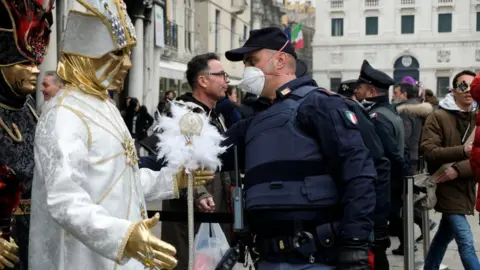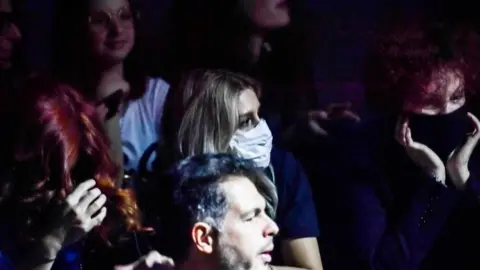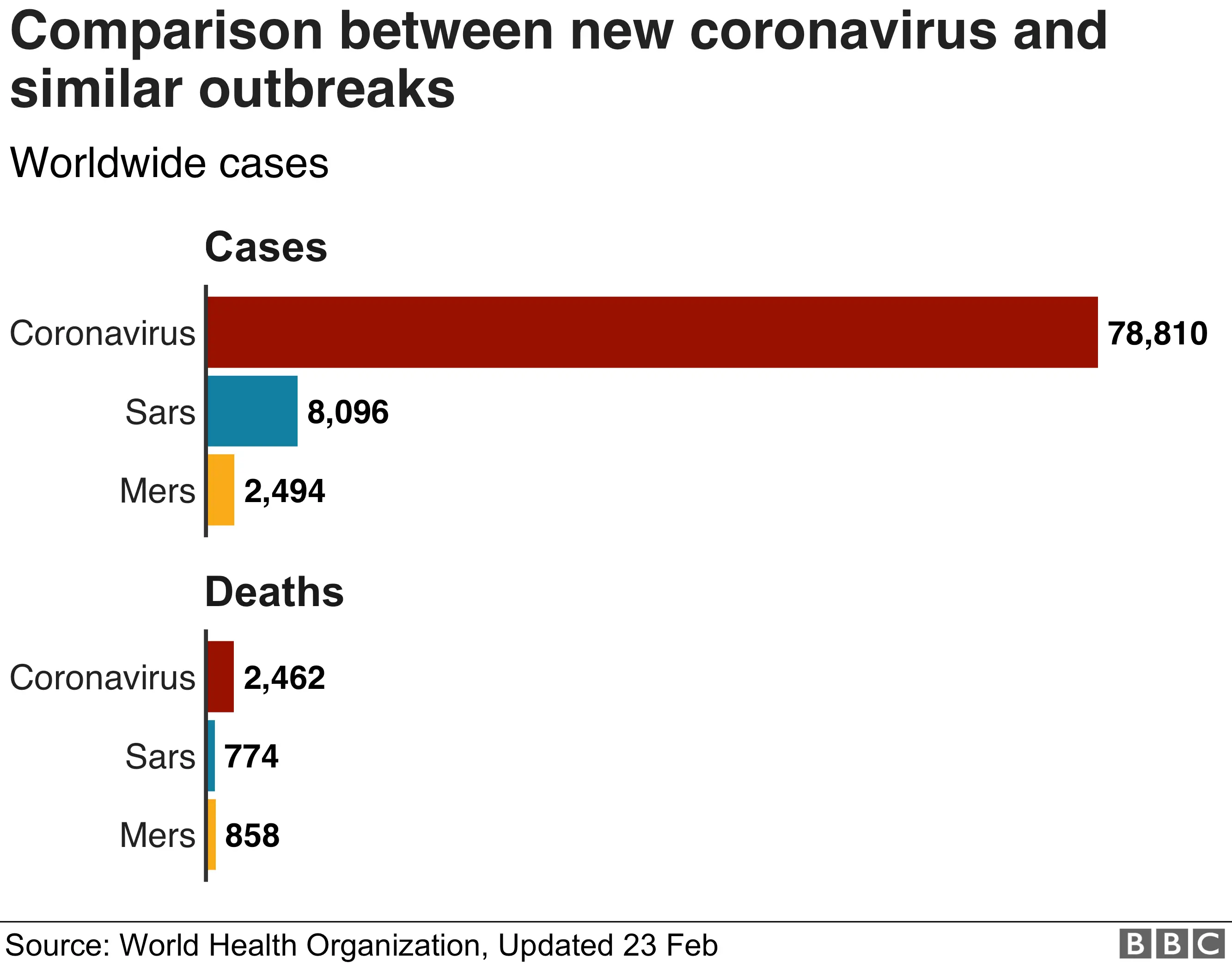Coronavirus: Venice Carnival closes as Italy imposes lockdown
Italian officials have cut short the Venice Carnival as they try to control what is now the worst outbreak of the coronavirus in Europe.
Authorities in the Veneto region said the event would end later on Sunday, two days earlier than scheduled.
Italy has by far the highest number of coronavirus cases in Europe, with 152. Three people have died.
Italy has imposed strict quarantine restrictions in two northern "hotspot" regions close to Milan and Venice.
About 50,000 people cannot enter or leave several towns in Veneto and Lombardy for the next two weeks without special permission. Even outside the zone, many businesses and schools have suspended activities, and sporting events have been cancelled including several top-flight football matches.
The BBC's Mark Lowen described the situation just outside the zone.
Allow X content?

In neighbouring Austria, a train from Venice was stopped at the Austrian border after it emerged that two passengers had fever symptoms. Austria's Interior Minister Karl Nehammer later confirmed to the BBC that the pair tested negative for coronavirus.
"All authorities have acted quickly and with great caution in this case," said Mr Nehammer in a statement. "The reporting chain worked without delay."
Elsewhere, authorities in South Korea and Iran are battling to control rising numbers of infections. South Korea has raised its coronavirus alert to the "highest level".
The new strain of coronavirus, which originated last year in Hubei province in China, causes a respiratory disease called Covid-19. China has seen more than 76,000 infections and 2,442 deaths.
What is happening in Italy?
Prime Minister Giuseppe Conte announced on Saturday that "extraordinary measures" would come into force to try to stem the rising number of coronavirus cases.
He said the quarantine restrictions could last for weeks.


Police, and if necessary the armed forces, will have the authority to ensure the regulations are enforced.
Angelo Borrelli, the head of Italy's Civil Protection Department, told reporters that 110 of the confirmed cases were in Lombardy, with 21 in Veneto with others in Emilia-Romagna and Lazio.
Officials reported a third death on Sunday, an elderly woman from the town of Crema suffering from cancer.
Italian officials say they are still trying to trace the source of the outbreak.
The Venice Carnival had been due to close on Tuesday but regional president Luca Zaia told Sky TG24 television on Sunday that it would be suspended, along with other events, in a bid to combat the virus.
"From this evening, we plan to stop carnival and all sporting activities until 1 March," he said.
 Reuters
ReutersUniversities in Milan have been closed and the city's mayor, Giuseppe Sala, said schools would also close their doors while the outbreak continued.
"As a precaution I think that the schools have to be closed in Milan. I will propose to the president of the region to enlarge the precaution to the entire metropolitan city area. It is just a precaution, we don't want to create panic," he said.
Colette Walsh, an English teacher living in the town of Lissone, told the BBC that supermarket shelves were empty as people were panic-buying.
 AFP
AFP"It's surreal, I have never seen anything like it," she said.
Meanwhile Giorgio Armani's fashion show, scheduled to be held in Milan on Sunday, went ahead but without any media or buyers present. The show was livestreamed on its website, Instagram and Facebook pages.
Dolce & Gabbana's fashion week show went ahead as normal, though, with some guests wearing surgical masks.
What is happening in South Korea?
On Sunday, South Korean President Moon Jae-in said the country faced "a grave turning point", and the next few days would be crucial in the battle to contain the outbreak.
South Korea has reported six deaths and more than 600 confirmed infections - the highest number outside China, although an outbreak of coronavirus on the Diamond Princess cruise ship docked in Yokohama, Japan, has also seen more than 600 cases.
"The government will raise the alert level to the highest level according to experts' recommendations," Mr Moon said.
Health officials revealed a further leap in the number of coronavirus cases with a cluster of infections linked to a hospital and to a religious group near the south-eastern city of Daegu.

Hopes and fears in Daegu

My phone kept screeching at me as we approached Daegu. Several emergency alert messages flashed up on it. It's an annoying and alarming sound, but it can be useful.
The messages tell you where a nearby confirmed coronavirus patient has been and at what time. They're incredibly detailed. It has times, dates, exact locations. For instance, one patient was in a Korean pool hall until 1.30am!
We were shown one of the newly designated coronavirus hospitals. Dozens of ambulances were lined up outside, being sprayed with disinfectant. In each one was a patient with coronavirus waiting to be admitted.
They are kept inside a plastic tunnel and transferred by staff who are head-to-toe in white protective clothing. Medics and staff rush in and out of the crisis centre, prioritising patients who need the most care. The majority of patients in hospital have mild symptoms.
Chi-Heum Cho, the director of the Keimyung University Dongsan Hospital, told me he hoped they could get this outbreak under control in the next week. But he knows a lot will depend on how far it has spread.
As you head outside, the streets of South Korea's fourth largest city feel almost abandoned. One or two people, with their heads down and mask on, walk purposefully past the shuttered shops. Most appear to be staying indoors.
One of the region's leading jewellery stores still had 50 hopeful staff sitting at their counters. A couple of them told me how worried they were about this virus spreading, mostly for their elderly parents or young children. They don't have the hospital director's confidence that this will be under control soon.

Of the 169 new cases announced in South Korea on Sunday, 95 of them are linked to a Christian sect in Daegu called the Shincheonji Church of Jesus, the Korea Centers for Disease Control and Prevention (KCDC) said. The total number of cases connected to the church stands at 329.
What's the latest from Iran?
Iran said on Sunday it had 43 confirmed cases of the virus, most of them in the holy city of Qom. Eight of those infected have died, the highest number of deaths outside China.
Iraq, Pakistan, Armenia and Turkey have closed their borders with Iran, and Afghanistan has suspended air and road travel to and from Iran.

What about China, where the outbreak started?
On Sunday, China's President Xi Jinping described the outbreak as the "largest public health emergency" in the country's recent history.
He acknowledged "shortcomings" in China's response and said lessons must be learned.
On Saturday, Chinese authorities reported a decrease in the rate of deaths and new cases of the coronavirus.
But outside China, cases with no clear link to that country or other confirmed cases continue to rise, prompting concern from the World Health Organization (WHO).


Are you in Italy? Have you been affected by the closures? Share your experiences by emailing [email protected].
Please include a contact number if you are willing to speak to a BBC journalist. You can also contact us in the following ways:
- WhatsApp: +44 7756 165803
- Tweet: @BBC_HaveYourSay
- Send pictures/video to [email protected]
- Upload your pictures / video here
- Please read our terms & conditions and privacy policy
